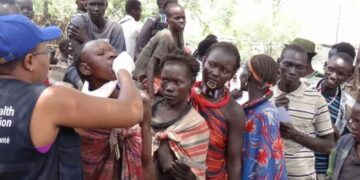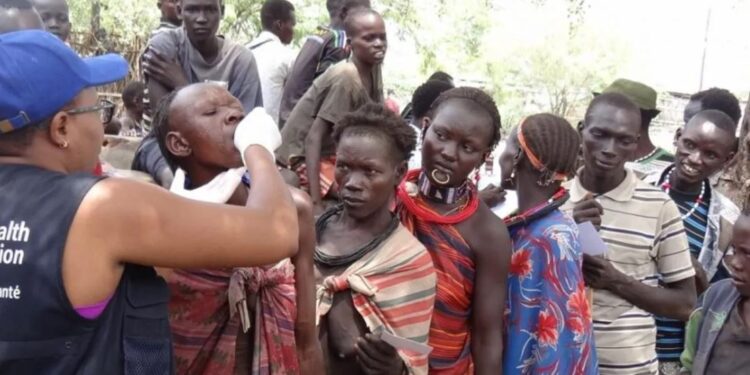By Ebi Kesiena
Port Sudan, situated along Sudan’s Red Sea coast, is struggling with a severe cholera outbreak worsened by a scarcity of medical supplies, a grim reality compounded by the ongoing conflict in the nation.
A university dormitory, initially designated for students, has been repurposed to accommodate over 1,000 displaced individuals seeking refuge from the dual challenges of warfare and the cholera epidemic.
According to Julia, who moved from the Sudanese capital Khartoum, the cleanliness in the shelters leaves much to be desired.
She lamented, “We are really afraid, and we work on cleanliness, but not everyone (among the displaced) is keen on it. There is a lot of dirt behind the place. I can clean in front of my place and make sure my children bathe. As you can see, these flies will not disappear unless the place becomes clean.”
Tragically, Julia had lost one of her two daughters to cholera just a month ago.
Since the official declaration of a cholera outbreak in Gedaref on September 26th, over 8,000 suspected cases, with 224 associated deaths have been reported. The epidemic has spread to 46 localities across nine states by December 2023.
Also, Dr. Ahlam Abdullah, Director General of the Red Sea province health sector at the Ministry of Health, highlighted the daunting challenges faced by Sudan’s healthcare system.
“Currently, 70% of the health system in Sudan is out of service as a result of wars and the destruction of healthcare facilities. We are facing a great task and a great challenge in providing service to all of Sudan. Now all of Sudan is in Port Sudan (referring to the displaced) and this is a great challenge.”
Expressing the critical need for international assistance, Dr. Abdullah added that, “The service delivery times are limited and not suitable for this number of displaced people. There is a shortage in the supply of medicines. We suffer greatly in providing treatment for people with all diseases and with cases of severe diarrhea. There are many challenges; we are doing what we can, and we hope that (international) organizations will help us more so that we can tackle these infections and can control them.”
Sudan’s conflict, which commenced in mid-April, has displaced over 7 million people, with more than 1.5 million seeking refuge in neighboring countries, according to U.N. figures. The dual crises of warfare and disease underscore the urgent need for coordinated international support to alleviate the suffering of the affected population.




































